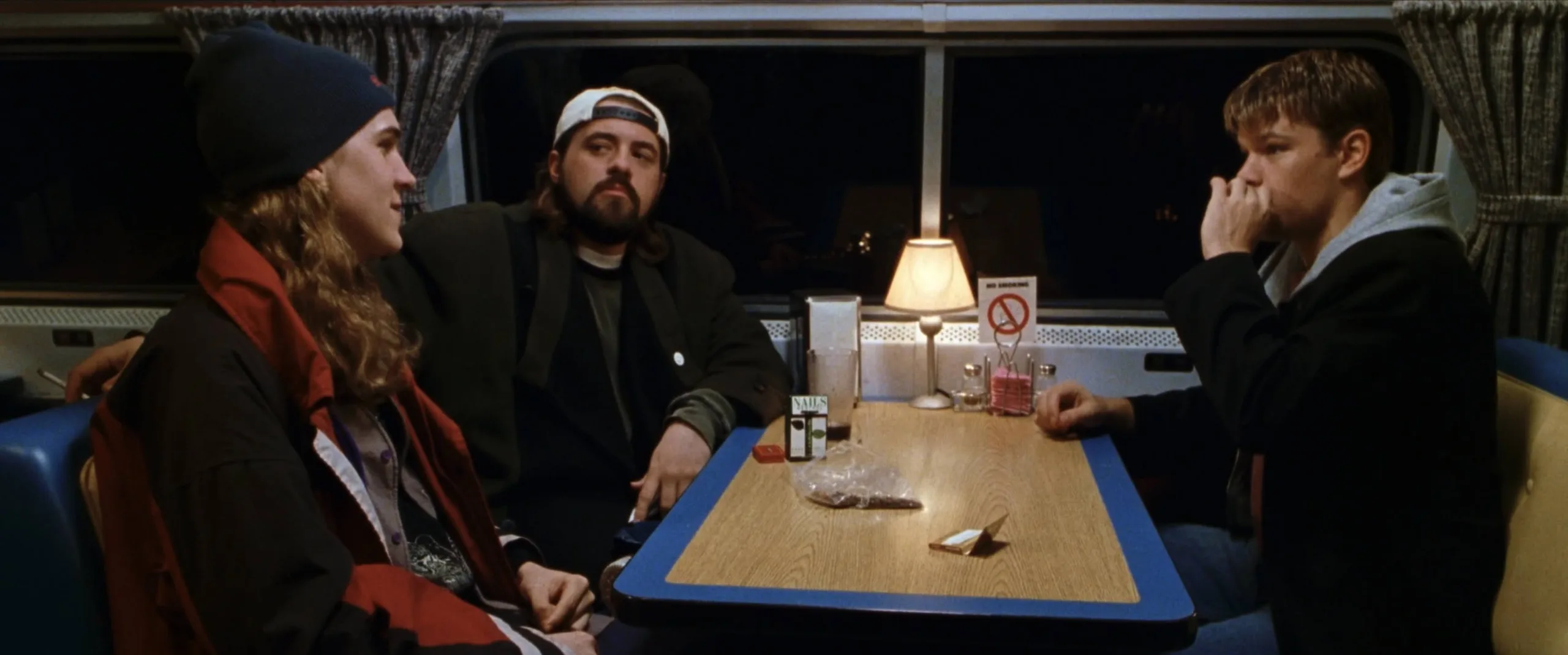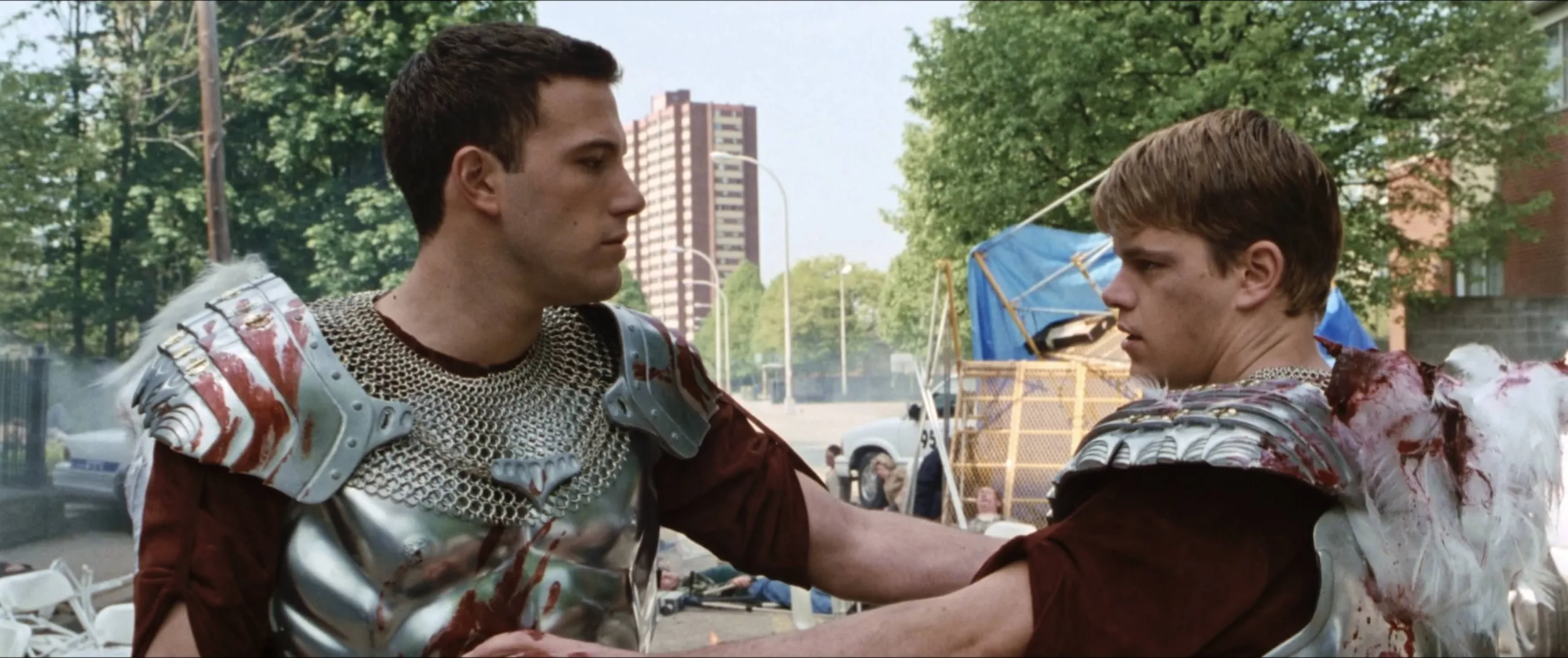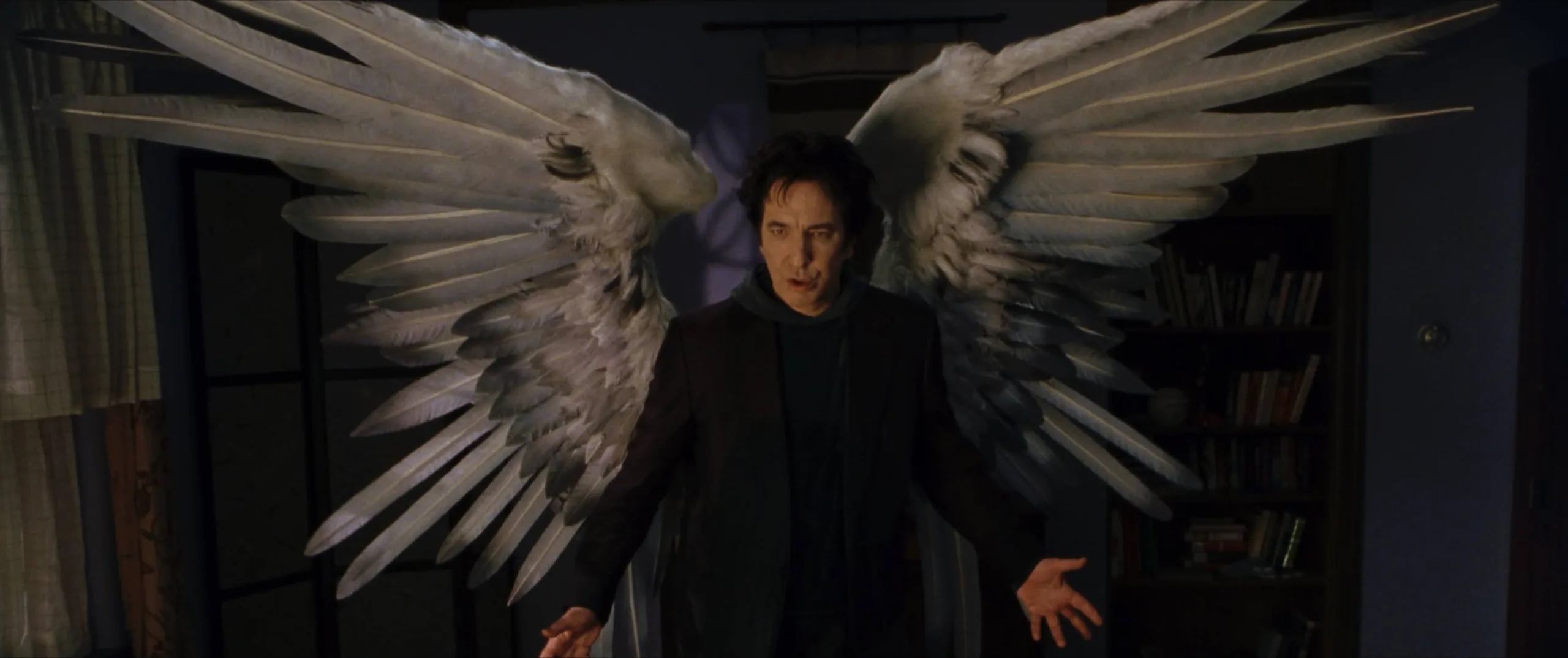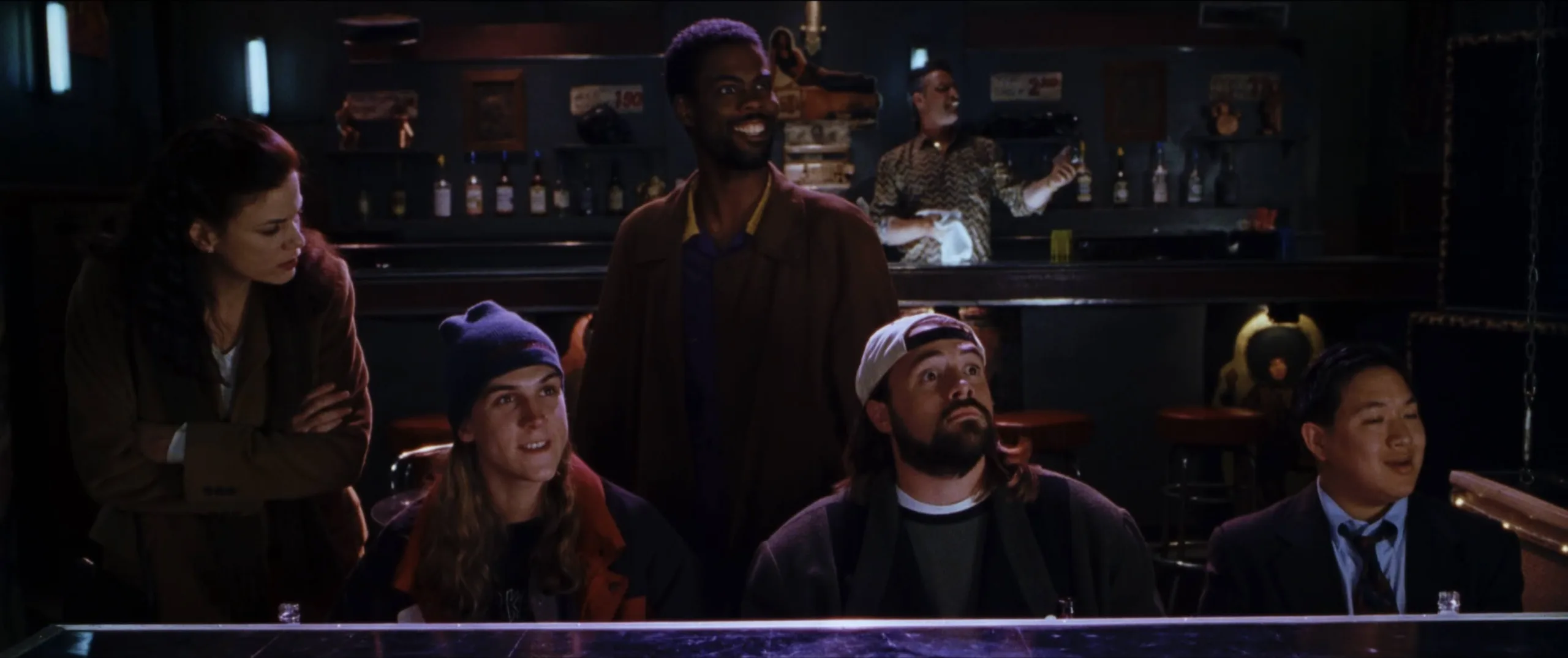For Kevin Smith, making “Dogma” was the ultimate expression of his own waning religiosity, filtered through the verbose, irreverent, and crude humor that made him one of the most revered filmmakers of the ’90s indie boom. The kernel of the script predates his microbudget hit debut “Clerks,” having begun as a script called “God” that allowed him to express his doubts as a flagging Catholic growing up in New Jersey. But in 1998, after making waves at Sundance with “Clerks,” striking out with his failed studio comedy “Mallrats,” and bouncing back with Miramax relationship dramedy “Chasing Amy,” Smith finally had the cachet—and the budget—to tackle headier subjects.
There are still dick and fart jokes, a Biblical poop monster called the Golgotha, and of course, his trusty Greek chorus, Jay (Jason Mewes, honestly never better) and Silent Bob (Smith). George Carlin plays an irreverent cardinal looking to jazz up Catholicism with a smiling, encouraging sigil called the “Buddy Christ,” and Chris Rock, in a suitably Mel Brooks-ian touch, plays the secret Black 13th apostle, Rufus.
But what charms about “Dogma,” even twenty-five years later, is its relative sincerity in grappling with issues of religious belief in an increasingly jaded postmodern world, centering on a jaded, reluctant Last Scion (Linda Fiorentino) tasked with preventing a couple of fallen angels (Ben Affleck and Matt Damon, fresh off their “Good Will Hunting” win) from inadvertently erasing existence by contradicting Catholic dogma.
It took an almost religious level of faith to believe that “Dogma” would succeed; indeed, upon release, the film was plagued by delays and protests for its alleged blasphemy. And for a while now, it had been the rare Smith film unavailable to stream or purchase anywhere, as Harvey and Bob Weinstein personally held the rights and had let them lapse without renewal. However, in an event befitting a miracle, Smith managed to regain the rights to “Dogma,” restored it in 4K with the help of cinematographer Robert Yeoman, and is releasing it in theaters for its 25th anniversary on June 5th.
Smith sat down with RogerEbert.com days after its screening at the 2025 Cannes Film Festival to talk about Ebert’s influence on him as a film fan and filmmaker, as well as the long road to recovering “Dogma” from the ashes of Harvey Weinstein’s reputation.
This interview has been edited for length and clarity.
It’s a pleasure to talk to you specifically for RogerEbert.com; I know Roger was a devotee of your work from the early goes. I’d love to hear more about your relationship with Roger in your work, especially around the time of “Dogma.”
You gotta remember, that was the gold standard in the day. Of course, you had Pauline Kael, later on Janet Maslin, before that Vincent Canby and stuff like that. But Roger Ebert and Gene Siskel, I grew up watching on PBS when it was “Sneak Previews,” long before it became “Siskel and Ebert at the Movies.” There was no Internet back then, kids. So if you wanted to interact with movie clips, you’d hope to see a review on the nightly news or maybe the network news.
But Siskel and Ebert were reliable, man; they’d have two movie clips per review. And whether you agreed with their review or not, that was also part of the fun. Because, in a proto-Internet-type fashion, you’re like, “What? Those guys don’t know what the fuck they’re talking about!” It created teams instantly. But you got to watch them bicker about the movie, which in the ’70s and ’80s was rare. Nowadays, you jump on Letterboxd or a chat site or comment section that has nothing to do with film whatsoever and get into a film conversation. The world is pretty film-literate now, particularly the Internet. But back then, not at all.
I remember getting a Betamax in 1983 and recording the reviews. It wasn’t so much to keep the reviews as it was to keep the clips of the movies. So Siskel and Ebert were a huge part of my childhood. And when I became a filmmaker, naturally, I was like, “What do they think? Thumbs up or thumbs down?” Both Ebert and Siskel loved “Clerks,” gave it a thumbs up. So that kicked off my career very well. I remember them reviewing it on the show, and my mind melting after years of watching them review other people’s movies, only to hear him talk about me. Roger was like, “In movies, jobs are, ‘you’re a cop’ or ‘you’re a king.’ You never see somebody just working a job, and in this movie, you get to see that.”

Roger was not a fan of “Mallrats.” He hated it and didn’t give it a good review. When I was onstage at the Indie Spirit Awards in 1996, I was presenting with Laura Dern. Before we even say a word, I get up there and say, “Hey man, while I’m up here, I just want to take this opportunity to apologize for ‘Mallrats.’ I don’t know what I was thinking.” Roger, in his review of “Chasing Amy,” wrote, “Kevin Smith made a movie so bad that he apologized for it. But this year, he’s back with the incredible ‘Chasing Amy’.” He wrote a wonderful review of that film, and he did for “Dogma.” “Dogma,” he was on board with. He said, “Look, you may need a catechism to understand most of this movie.” But having him talk about my work was tremendous.
I worked with, or rather for, him at one point: When he was getting sick, they had people filling in on the show, so I got to sit down with [Richard] Roeper and review in the style I’d grown up watching Roger and Gene do. Of all the things I’ve gotten to do in my career, that was one of those side hustles that left me awestruck. I’m gonna meet Eborsisk, you know? From “Willow.”
Roger was a big figure in my life, and I was bummed like everybody when he passed far too early. Because he gave me a lot of joy. He didn’t make the movies, but he was a conduit to the earliest movie discussions I could get into via the mainstream. You could watch him with your family, your parents, your brother or sister, and get into conversations about whether he was right or wrong. It’s what we do almost every day on the Internet now, but you didn’t need the interconnectivity with everyone else.
Unlike the Kaels and the Canbys of the day, Roger was a very working-class critic, too; if there ever was a mainstream critic who could enjoy dick and fart jokes, it was the screenwriter of “Beyond the Valley of the Dolls.”
Absolutely, hands down. It’s a good thing that Roger didn’t review for The New York Times or The Washington Post. It might have made him a little stuffier. But the fact he was a Chicago kid, you felt like he was identifiable. I also always think about his controlled passion while he was on the show. He would rarely lose it; no “Fuck you Gene!” He would be like, “You just don’t understand what it’s doing! You just don’t get it.” He was very passionate, but measured in his facial expressions.

Let’s talk about “Dogma” a little bit; I feel like it was a crazy road getting it back into your hands from Harvey Weinstein’s ownership. Tell me that story.
A few years ago, I tried to get this movie back, because back in the day when we made it in 1998, it was under the aegis of Miramax, which was a Disney company at that point. Once it was done, it was a polemic; people were upset about it even though they’d never seen it. So Disney told Miramax, “Get rid of this movie.” Clench your assholes, kids, here comes the name: Harvey Weinstein personally (supposedly, allegedly) bought the movie and distributed through a young Canadian company at the time called Lionsgate, which hadn’t done anything that wide release at that point. Then Columbia Tristar got it for home video and had it for ten, fifteen years. Those deals lapsed, and I started getting people blowing me up online, saying, “I can’t buy ‘Dogma’ anymore unless I buy it on eBay for 100 bucks. What gives?”
I’d left the Weinstein Company in 2008 after “Zack and Miri Make a Porno,” before the 10th anniversary of “Dogma.” So I started sending emails. Nothing, silence. Didn’t hear anything for nine years. Then one day I get a phone call; this is after Weinstein Company is back on top with “The Artist” and shit. He could give a fuck about an old movie. But they’re like “Hold for Harvey Weinstein.” He goes, “Kevin, it’s Harvey. I’ve just realized I’ve got ‘Dogma’ and we’re not doing anything with it. We could probably make a sequel, or a streaming series.’ I was like, “Yes, it can, man!” He says we’ll get into it next week. I was so happy to hear from him about this forgotten movie. Fuck, there’s a future for “Dogma.”
Three days later, the New York Times piece runs, and we found out who Harvey fucking was. I remember feeling scared because I thought, “That guy just called me.” So I spoke to [producer] Jonathan Gordon, who hadn’t been there in years, and told him Harvey had called me and talked about making a “Dogma” sequel. Jon goes, “Kevin. He was never gonna make a ‘Dogma’ sequel. He was just calling to see if you were one of the sources of the New York Times piece. The fact that you answered the phone told him that you weren’t.” ‘Dogma’ was just a way to have a conversation with me.
In terms of the egregious things Harvey Weinstein’s done? Not even on the fucking list. But it was out of my hands. I was never gonna have this movie back.

Then this woman, Alessandra Williams, who grew up in the same neck of the woods as me in central Jersey, saw me telling that story, and thought, “Somebody should help him.” She literally got involved and did what I couldn’t. I tried to buy the movie back three times and got no answer from anybody. She bought a tranche of movies from Harvey, because I guess he’s in court again now facing new charges; he needed legal defense funds, so he sold off what he personally owned. There were a couple karate movies, “Dogma,” Larry Clark’s first movie, “Kids,” and “Fahrenheit 9/11,” Michael Moore’s movie. She bought all those movies, sold off the rest, and held onto “Dogma.” She came to me and asked, “What do you want to do with it?”
We’re now releasing it on 2,000 screens on June 5th. It’s gonna be on more screens than when the movie came out in 1999. Now we’re a summer movie. I tried to make all this happen for years, and I couldn’t. Alessandra pulled it off. It was absolutely amazing. What an incredible manifester. She rescued my movie about angels from the devil himself.
I’ll leave you with one last question: How do you think [George Carlin’s] Cardinal Glick would have done in the Conclave?
You know, Cardinal Glick’s chances during “Conclave” would not have been high. Having watched the movie, I can’t see him doing well in this crowd. They seem very stuffy. He was a visionary, you know? A marketeer. He’s the guy behind the guy, if anything. I assume he was the guy pushing for the first Pope from the United States. How do we not vote in that direction?
And now we’ve got a Chicago Pope.
Exactly!












